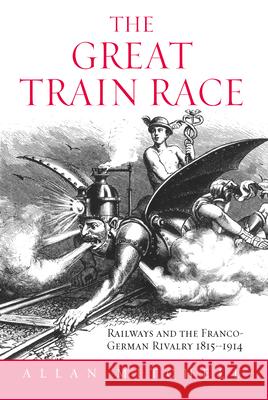The Great Train Race: Railways and the Franco-German Rivalry, 1815-1914 » książka
The Great Train Race: Railways and the Franco-German Rivalry, 1815-1914
ISBN-13: 9781845451363 / Angielski / Miękka / 2006 / 356 str.
The Great Train Race: Railways and the Franco-German Rivalry, 1815-1914
ISBN-13: 9781845451363 / Angielski / Miękka / 2006 / 356 str.
(netto: 130,37 VAT: 5%)
Najniższa cena z 30 dni: 134,94
ok. 30 dni roboczych.
Darmowa dostawa!
"The breadth of this] comparative study of French and German railroad development - the largest and most important railway systems on the continent - is a signal achievement. . . A brief sketch of the book's trajectory does justice neither to the wealth of detail nor to the arresting insights that future historians will draw on for years to come." - Central European History "For Mitchell, this was clearly a labor of love, and it is a pleasure to see a job well done. The book has a full scholarly apparatus along with vital charts and maps to keep things clear." - H-German "Allan Mitchell is presenting, with The Great Train Race, a highly informed and ambitious study, in which the fundamental importance of trains for the societies of both countries has been convincingly argued." - Historische Zeitschrift From their origins, railways produced an intense competition between the two major continental systems in France and Germany. Fitting a new technology into existing political institutions and social habits, these two nations became inexorably involved in industrial and commercial rivalry that eventually escalated into the armed conflict of 1914. Based on many years of research in French and German archives, this study examines the adaptation of railroads and steam engines from Britain to the continent of Europe after the Napoleonic age. A fascinating example of how the same technology, borrowed at the same time from the same source, was assimilated differently by the two continental powers, this book offers a groundbreaking analysis of the crossroads of technology and politics during the first Industrial Revolution. Allan Mitchell is Professor Emeritus at the University of California, San Diego. Trained in both France and Germany, he has become a distinguished proponent of comparative European History.
"The breadth of [this] comparative study of French and German railroad development - the largest and most important railway systems on the continent - is a signal achievement. . . A brief sketch of the books trajectory does justice neither to the wealth of detail nor to the arresting insights that future historians will draw on for years to come." · Central European History "For Mitchell, this was clearly a labor of love, and it is a pleasure to see a job well done. The book has a full scholarly apparatus along with vital charts and maps to keep things clear." · H-German"Allan Mitchell is presenting, with The Great Train Race, a highly informed and ambitious study, in which the fundamental importance of trains for the societies of both countries has been convincingly argued." · Historische ZeitschriftFrom their origins, railways produced an intense competition between the two major continental systems in France and Germany. Fitting a new technology into existing political institutions and social habits, these two nations became inexorably involved in industrial and commercial rivalry that eventually escalated into the armed conflict of 1914. Based on many years of research in French and German archives, this study examines the adaptation of railroads and steam engines from Britain to the continent of Europe after the Napoleonic age. A fascinating example of how the same technology, borrowed at the same time from the same source, was assimilated differently by the two continental powers, this book offers a groundbreaking analysis of the crossroads of technology and politics during the first Industrial Revolution.Allan Mitchell is Professor Emeritus at the University of California, San Diego. Trained in both France and Germany, he has become a distinguished proponent of comparative European History.











